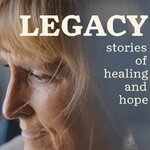

MONTE VISTA— About 35 farmers, ranchers, and their friends attended a showing of the mental health documentary film "Legacy," at the Ski-Hi Complex in Monte Vista on the evening of July 18.
The film, a partnership between the Colorado Farm Bureau and the Colorado Department of Agriculture, depicts the mental health struggles of ranchers and farmers in the state.
Earlier this month CDA Commissioner Kate Greenberg told the Valley Courier, "The film that we put together with the Farm Bureau is part of our continuing efforts to destigmatize asking for help. Ours is twofold, help increase access to [mental health] services.
“We're not a mental health service provider but we want to help people who need services, we want to connect people to providers in their communities. The second strategy is to destigmatize this. We are a tough bunch of folks, so many of you do it alone, you figure stuff out yourself. If people are struggling you don't have to do it alone, it is okay to struggle, and you don't have to do it alone."
Mental health issues in the rural agricultural community, where rugged individualism is a proud tradition, are often more pronounced in the non-agricultural sector. That "cowboy up" ethos results in a suicide rate among farmers and ranchers that is 3.5 times that of the non-ag population according to a study by the National Rural Health Association.
The film is a heart-wrenching journey into the factors contributing to rural mental health, where fear of stigma and discrimination contribute to significant reluctance for people to seek treatment.
From paying bills to feeding their children, caring for the livestock and crops, retirement options, and even what they will be able to leave their heirs, the worry and anxiety can be overwhelming, and "Legacy," does an excellent job of showing these vexing anxieties.
In the film, rancher Tony Hass offered this assessment that may resonate well in the rural San Luis Valley describing why farmers are reluctant to seek counseling: "It's not like you're going to go for mental health to go see a shrink and they see your green Dodge pickup with the caved in front quarter panel that everybody knows, and your dog's sitting in the back."
Jacob Walter with the Walter Family Ranch said this about the numerous pressures of farming, "One of the things that really sticks in my mind was when I would see my dad sitting at that kitchen table until one or two in the morning crunching numbers and figuring out how you are going to make it work, how are you going to keep the family going, how are you going to keep that family legacy of agriculture going?”
He added, "Before I left, the last things my dad said to me were, 'Always remember, things are never bad enough that you can't get help, you can always get help.' I told him I loved him; he told me he loved me, and I got in my pickup. I started driving for college and that was the last time that I talked to him."
Walter said the following morning his father committed suicide.
After the showing of Legacy, a panel discussion that included farmers, ranchers, and Licensed Professional Councilors Chad Reznicek, MA, PLC, and Kristen Wulfsberg, LPC who were featured in the film ensued.
In "Legacy," Wulfsberg speaks to the agony she has experienced with clients in ag who feel, "I'm a burden, I'm causing more problems, I can't see a future, I can only see pain, I can only see sorrow, I can only see disappointment. I have talked with a couple of people in ag who say when my horse is lame, I take it out to the back forty.
“So why can't I do that same thing to myself? Am I contributing enough, am I doing enough, am I enough? That is where it ends up going. And when the question is am I enough, that's where we get into concerning thought patterns and behaviors."
After the showing of "Legacy," in Monte Vista, Marlys Hersey, Licensed Professional Counselor said of the film, "It was very illuminating. Even as a therapist who works with many clients with suicidal thoughts and actions, this film brought to light the many aspects of mental health specific to the agricultural community of which I was not aware. I particularly appreciated the emphasis on the need for all of us to cultivate social connections, and the need for all of us to ask for, receive, and give help within our communities.”
Help is available.
Larry Brown with CSU Extension and JC Carrica with Valley-Wide Health, were in attendance and briefly discussed a local mental health partnership, the Coffee Break Project. Brown summed up the project with its mission statement, "Do you look after your neighbors as close as your crop or herd?
The two will make a presentation on Monday to the San Luis Valley Commissioners Association regarding the partnership, and the Valley Courier will have an article about the project next Tuesday.
The film also notes that mental health services and sessions with therapists are increasingly available and includes a clip of a rancher in a pickup truck having a private session with a therapist, away from the glare of friends who otherwise might.
"Legacy,” is available for free on the CDA YouTube page. Search: Legacy mental health in Colorado's modern-day agriculture.
Resources